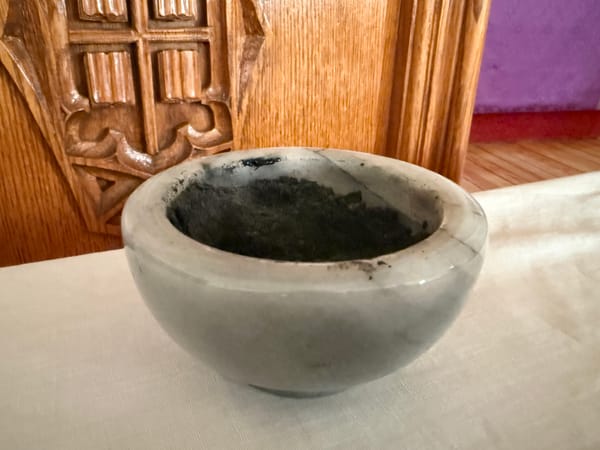The Life that Really is Life
We are invited to the life that really is life, the life of service, of giving up our love of money, of finding security and happiness in God alone.

September 28, 2025 - The Sixteenth Sunday after Pentecost
My friends, I speak to you today in the name of one God, Father, Son, and Holy Spirit. Amen. Please be seated.
Good morning, Epiphany. This last week, on Wednesday night, one of my friends from seminary in Tennessee was ordained to the priesthood up in Alpena, Michigan, where he now serves as the rector of Trinity Episcopal Church. Matt and his wife Nora welcomed baby Phoebe to their family this summer too, so it’s been quite a summer for their family. Some of you may know that I have a group of priests that I discuss the lectionary with each week, and Matt is among them. New to Trinity like I was new here at Epiphany last summer, Matt has had to preach from a difficult string of parables to start his relationship with the people of Alpena, and I do not envy him that. He said this week, “I cannot wait for this section of Luke to end.” Some of you may be feeling the same.
Last week’s gospel text was a complicated and difficult one, the story of the dishonest or shrewd manager, who we decided, after considering many interpretations, was prioritizing relationships over wealth, something we are also called to do. This week’s gospel text is a bit more straightforward, I think, but no less difficult to hear, and again, it lands on the theme of wealth and relationship. (It may be one of my favorite parables.) I could try to preach the same sermon as I did last week, but though I do hesitate to bash you over the head with “you cannot serve both God and money” too many times, Jesus has no such qualms about reminding the Pharisees where their priorities should lie.
This is, after all, a section of Luke’s gospel where Jesus is speaking to the Pharisees, the pious, an influential Jewish group known for their strict observance of the law. We skipped a few verses between last week’s parable and this week’s, and those verses include verse 14, which says, “The Pharisees, who were lovers of money, heard all (that Jesus was saying) and they ridiculed him.” That phrase, I think, is an important one. The Pharisees, who were lovers of money, they did not want to hear what Jesus was saying.
But Jesus says it, nonetheless. He says it with two parables, the parable of the dishonest manager and now the parable of the rich man and Lazarus. Jesus tells them their focus on wealth, not on God, not on relationship, not on the poor who they could certainly help, that focus on wealth will keep them from joy, both in this life and in the life to come. It will keep them from love, it will keep them from the goodness God has for them.
I realized this week that this was the subject of my very first sermon, not my first sermon here, but my first sermon ever, back in the summer of 2007. Another quick story from my travel vault then. In 2006, I graduated from college and immediately left for Africa, heading abroad another time, this time to serve as a volunteer with a Christian non-profit. It was a difficult year in many ways; I was lonely, an idealistic and liberal 22-year-old mixed in with mostly older, conservative couples who had spent decades abroad... I felt under-used too, a bit of a misfit in an office where they weren’t sure what work they needed me to do. And so, I floated... I volunteered to be a photographer and evaluator for disaster relief programs in Kenya and in Zambia. I helped with HIV-AIDS education and child development programs in rural South Africa. I helped organize a graduation service in Swaziland, now known as Eswatini. It was a wide-ranging, hard, beautiful experience.
In the last few months of my time in Africa, I was a project assistant for a roofing ministry, bringing American-funded roofs to churches in rural Mozambique. Our three-person team would gather materials from the capital, Maputo, and then spend weeks driving around the country, visiting small churches in the bush, as they call it, helping with basic construction on meeting places so these communities could gather together, rain or shine. It was an interesting project, to be sure, one I could spend hours dissecting now, but the key lesson that emerged for me out of that experience became the subject for my first sermon, one preached on my return to our suburban church in southern Illinois.
This lesson will be a familiar one to many of you, I think, familiar out of your own experiences, and it runs into many cliches, so I’ll try to make it brief and not preach for 45+ minutes like I did back then. This lesson was this: the happiest people that I encountered in my entire time in Africa were not the missionaries nor the nonprofit directors. The happiest people, genuinely, were those who had the least. You can argue with me rightly that those people were suffering, that they had inadequate access to healthcare and electricity and running water and education and basic shelter and safety, and those things are certainly true. But the joy we experienced among the people who had so little, that joy was contagious and impossible to ignore. The biggest cliché of mission trips abroad is very, very true; that experience, those people, they taught me far more than I ever helped them.
The sermon I preached on my return centered around a blind boy we met in Mozambique named Joseph. My parents likely remember his story. In my brief time with his family, over a few days, I had little office work to do, and so I played with the kids, and I built Joseph a small swing. I helped him hold on as his sister pushed him, and thanks to some photos we took, I can still remember the joy on all their faces, but Joseph’s blind-eyed joy is unforgettable. This family had very, very little. They slept outside and washed their clothes in the river. But there, I encountered real joy, both theirs... and really, my own.
Now, back to the gospel. This morning, we have the story of the rich man and Lazarus, the poor man who sat suffering at the rich man’s gate. Lazarus here is covered with sores, he longed to satisfy his hunger with crumbs, he is being licked by dogs, and he dies; there is very little joy in Lazarus’s life on earth, he is not a like-for-like comparison to little Joseph in Mozambique. He has a miserable, pitiable life. The unnamed rich man, the one who had fine clothing and large feasts, he also dies, and we know very little about him other than he still treats Lazarus as “less than,” as a servant, even after they both are dead.
Now, some preachers over the years have used this parable as irrefutable proof of an afterlife, existing just like this, of a hell where we are tormented for all eternity and a heaven where we can rejoice with the angels and all who’ve gone before us. “Better make the right decisions, everyone, otherwise you’ll suffer forever.” That’s not the most informed view, I’d argue, along with many theologians throughout the centuries before fundamentalism took imagery and poetry and first-century folktales literally. Instead, here, we have Jesus using first-century imagery to tell a group of money-loving Pharisees that they’re missing the entire point of this entire life. Their love of money is blinding them from those who need them, those who could use the extra wealth they have just to survive. That love of money, their relentless pursuit of more than they actually need, it is keeping them from real joy, the sort of joy you find in helping the poor and hungry servant at the gate, in loving your neighbor as yourself. Their love of money is hurting others, yes, and their love of money is keeping them from joy too. And maybe, also, that love of money will keep them from joy, from relationship, from real love, for all eternity.
St. Paul beautifully jumps on this message in his first letter to Timothy, in the last verses Marti read to us this morning: “As for those who in the present age are rich,” and we as Americans are all relatively rich, let alone those of us lucky enough to be here at Epiphany this morning, “As for those...” as for us... “command them not to be haughty, or to set their hopes on the uncertainty of riches, but rather on God who richly provides us with everything for our enjoyment. They are to do good, to be rich in good works, generous, and ready to share, thus storing up for themselves the treasure of a good foundation for the future, so that they may take hold of the life that really is life.”
That last line, those last few words of the 1 Timothy reading, I want to tattoo them on my arm, I want to write them on every doorpost, I want to make them the sign-off for every email. “Take hold of the life that really is life.” Friends, this morning, that is our message, that is the call for all of us out of this parable, out of this epistle, out of our entire life as Christ-followers, as Christians. We can spend our time dressed in fine clothes, we can feast sumptuously every day, but those things will inevitably blind us, they will get in the way of love. We can ignore the poor man at our gate, we can ignore anyone in need, but if we do, we are missing out on real joy, we are missing out on life, and that will keep us from love and relationship in this life and maybe even in the next.
But we are not called to do good works so that we can get a nicer room in heaven someday. We are especially not called to do good works as some sort of self-flagellation, self-sacrifice, self-discipline, some self-denying punishment because we are “really good Christians.” Friends, we are invited this morning to the life that really is life, the life of service, the life of giving up our love of money, the life of finding security and happiness in God and in God alone, in God’s abundant, Christ-like love. We are invited to joy.
This is the joy I encountered in Africa, right? The joy most visible when all else is stripped away, when a poor, blind boy experiences a swing for the first time, when I wasn’t too busy or distracted to just play with the kids, when I was privileged enough to help Joseph experience the breeze in his hair, the excitement of a swing. And this joy doesn’t only come on mission trips or years of volunteer service abroad! This is the joy we experience here at Epiphany when we serve others, when we prepare meals or clean tables at brunch, when we write cards or make visits with the Parish Care Team, when we spend time in service of each other without grumbling or expectation. This is the joy many of us experience at Pullman or with We Care, when we serve those in dire need and feel like for once, we might be doing something important, something good. This is the joy when our donation drives overflow, as both of ours have this month. This is the joy we have all experienced at some point when we put down our selfishness and choose to love the other. Wealth of all kinds can blind us to joy, but joy is there for us this morning, it is always there for us, if we choose it.
It is our choice if we will be this rich man, ignoring the poor man at our gate, treating him as less than, and then dying just like him and everyone else anyway. It is our choice if we lock the doors of hell from the inside, staying in our own world of transactional relationships and foolishly hoarding our wealth for the sake of our own security and comfort.
Friends, I pray that spending time here at Epiphany encourages all of us to choose differently, that it provides us reminders and opportunities to choose differently. I pray that we learn here that the way to happiness is not living large with the biggest and best toys, that we learn here that wealth and security can oh so easily blind us to the life that really is life. And, I pray that we know, every day, that we are invited, always invited, to join hands with Jesus, to join in on eternal joy, loving God and loving neighbor, here, now, and forevermore.
Amen.




